#madame de chevreuse
Text
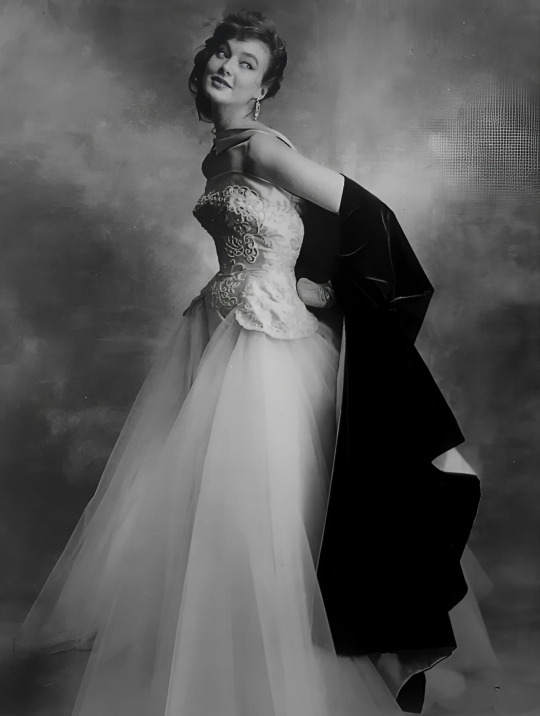
Carven Haute Couture Collection Fall/Winter 1954-55
Helena Madsen wears the “Madame de Chevreuse” evening dress.
Carven Collection Haute Couture Automne/Hiver 1954-55
Helena Madsen porte la robe du soir "Madame de Chevreuse".
#collection haute couture#fashion 50s#1954-55#fall/winter#automne/hiver#french designer#french style#carven#madame de chevreuse#helena madsen#evening gown#robe du soir
11 notes
·
View notes
Text

As my lovely wife @zoi-no-miko said "We must feed the source of our marriage!"
And so, I bring you my sacrifice and review of the OTHER 2023 The Three Musketeers movie, compliments of the UK. And this one has a Black d'Artagnan! Unfortunately it also has a 1.8/10 IMDB rating 🤣
Ramblings and review under the cut!
Having watched this 94 minute "masterpiece" I must start by saying, this is not an adaptation of the Dumas novel, it's an adaptation of the 1993 Disney version of The Three Musketeers. So, all the best parts are lifted straight out of the Disney movie, including direct lines of dialogue, and the best action sequences. Le sigh.
The plot is also quite similar. The Cardinal plots to have the young king assassinated, and to accomplish this, he has an elaborate plot to disband the musketeers and implicate them in the murder. A one eyed Rochefort and a comely Indian Milady are his co-cosprators.
Richelieu, who I must keep reminding everyone was in his late 30s during this time historically, now looks like this:
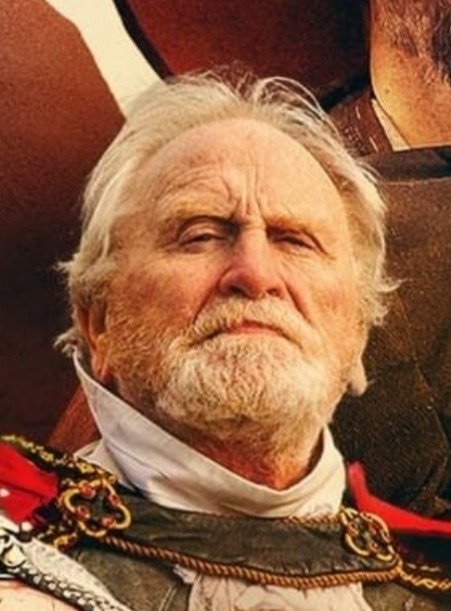
And the musketeers, delightful assholes that they are, look like this:


That's right. They are so poor, they can't even afford pants! Just kidding, but for Reasons, they spend a fairly long scene pantless, and require the help of "Madam Chevreuse" (an homage to Marie de Rohan) and "Madam Coquenard" (an homage to Porthos' wife), who were a delightful little invention that I rather appreciated. Especially since Porthos had to sleep with them both in exchange for their help 🤭👌🏻.
Unfortunately, the rest of the movie is fairly Meh. Unlike The Fourth Musketeer, which took place entirely indoors, this one does its low budget business entirely in some "forest" which looks a lot like a local park. There are also about 11 extras who have to cover their faces in every scene so that they can be killed over and over again. The dialogue is really stilted, d'Artagnan is as breathtakingly dumb as the one in The Fourth Musketeer, and the pacing is completely off, causing surprisingly dull periods to pass that make the movie feel a lot longer than it is.
In a plot device that is truly inspiring in its stupidity, people go around saying things like "Have you seen this symbol ⚜️? Take a good look at it ⚜️⚜️" as if all of France isn't literally covered in ⚜️⚜️⚜️, including the embellishments around d'Artagnan's own neck. At least they use proper French currency in this one.
I think the biggest problem the movie has is that it fails to commit to a genre, going from slapstick comedy to taking itself way too seriously within minutes.
So, in summary, this fails spectacularly as both an adaptation of the book AND as an adaptation of the Disney movie. The casting of the 3 assholes was actually pretty good and it did have some fun moments, but all of them were plagiarized so I can't really give them points for it. It's really disappointing that with all the juicy goodness that both sources of material have to offer, the result is this lackluster and forgettable experience.
Grade: I have to give it an F for originality, and as an adaptation of the Disney movie it gets a C+.
17 notes
·
View notes
Note
I saw your selfship art with the Three Mousketeers movie, it’s one of my fave Mickey movies lol what do you think your sonas role would be in the movie!
Keep up the cute art :D
Well, since Pete is based on Cardinal Richelieu and Mickey is probably based on Athos, I was thinking of having my sona based on either Madame de Chevreuse or Lady de Winter. Or I might just make her Pete’s maid idk yet.
14 notes
·
View notes
Text
Reading 20 Years After and getting increasingly unhinged about what my slutty idiot boys have been doing for 20 years (getting land, being a dad, slutting it up and being a mediocre junior officer). Madame de Chevreuse is the only person in France with a brain cell to call her own.
1 note
·
View note
Note
Glad you liked Three Musketeers! How did you like the servants, the dames, the four merry friends themselves? Were there characters you liked especially? It would be very interesting to see what you'd make of the 2nd book, considering you're also reading a lot of Arthurian legends! Теперь Вы тоже знаете, откуда взялась та сцена "Имя, сестра, имя!" ;)) Мне она всегда казалась очень странной и скомканной до прочтения книги! Анна де Бейл - это что-то)) Констанция тоже прекрасна)))
Yeah, it was a lot of fun! I am honestly in love with Constance, she's so sweet and so devoted to her queen and also so readily jumping into all kinds of danger. She really deserved better, and might be my favourite character in the book. And Milady, of course, is a captivating villainess, and, truly, if if wasn't for her poisoning Constance, I'd be very "god forbid women do anything" about her. Kitty is a sweetheart and I wanted to punch d'Artagnan for how he treated her. Oh, and I'm very much intrigued by Madame de Chevreuse, I hope there's more of her in the next parts of the trilogy. She reminds me of my dearly beloved Duchess R of Winnipeg - a mysterious player pulling strings behind the scenes, no face, no speaking lines, just fleeting appearances and coded letters.
The servants were super funny. Planchet might be my favourite, but they all are great (and should be payed more for *gestures at everything*).
The titular four... well, I stand by what I thought back when I tried to read this novel for the first time - they are dicks, but this time I was able to be entertained by them. A protagonist doesn't always have to be a person you like, sometimes it's enough with a little piece of shit who gets Put into Situations :D I'd still slap d'Artagnan, though - for Kitty and, yes, for tricking Milady into sleeping with him. I think Porthos was my favourite - his adventures in being a sugar baby were hilarious to read, and for some reason it touched me that he cried when Constance died.
Hmm, what you said about Arthurian legends made me very curious to read the second book 👀 I'm planning to start it as soon as I finish the one I'm currently reading.
#asks#anonymous#мне надо было завести для вас отдельный тег для Того Самого Замечательного Анона) но уже поздновато#gella talks musketeers
1 note
·
View note
Text
Se stai cercando qualcosa di specifico, digita “item:” nella barra di ricerca, seguito dal nome in inglese dell’oggetto.
Che tipo di informazioni stai cercando?
Libri | Storie del personaggio | Manufatti | Altro
Clicca qui se desideri visualizzare tutti i contenuti disponibili in italiano. Oppure... stai cercando qualcosa di specifico?
Nazioni
Fontaine | Inazuma | Khaenri’ah | Liyue | Mondstadt | Natlan | Snezhnaya | Sumeru
Località specifiche
Enkanomiya | Gurabad | Gran Santuario di Narukami | Isola di Tsurumi | Isola di Watatsumi | Isola di Yashiori | Picco del Drago | Tulaytullah | Villaggio di Aaru | Villaggio di Acquachiara | Villaggio di Qiaoying | Villaggio di Qingce | Villaggio di Vimara | la Voragine
Divinità
Andrius | Baal | Barbatos | Beelzebul | Baal | Buer | Decarabian | Egeria | Focalors | Haagentus | Istaroth | Marchosius | Morax | Nabu Malikata | Orobashi | Ouroboros | Phanes | Re Deshret | Remus | Rukkhadevata | le Sorelle Lune
Figure storiche
Alain Guillotin | Amos | Apep | Azhdaha | Bardo senza nome | Bonanus | Bosacius | Dvalin | Durin | Indarias | Kanna Kapatcir | Kitsune Saiguu | Madame Ping | Menogias | Sasayuri | Vennessa | Vestale delle nuvole
Razze mistiche
Adepti (Yaksha) | Aranara | Djinn | Draghi | Oceanidi | Seelie | Youkai (Kitsune - Neko - Oni - Tanuki - Tengu)
Fazioni umane
Akademiya di Sumeru | Cavalieri di Favonius | Chiesa di Favonius | Commissione Kanjou | Commissione Tenryou | Commissione Yashiro | Eremiti | Fatui (Casa del Focolare) | Lawrence Clan | Matra | Milleliti | Qixing | i Serpenti neri
Persone (personaggi giocabili)
Albedo | Alhaitham | Amber | Arataki Itto | Barbara Pegg | Baizhu | Beidou | Bennett | Candace | Charlotte | Chevreuse | Chiori | Chongyun | Clorinde | Collei | Cyno | Dehya | Diluc Ragnivindr | Diona Kätzlein | Dori Sangemah Bay | Eula Lawrence | Faruzan | Fischl | Furina de Fontaine | Gaming | Ganyu | Gorou | Hu Tao | Jean Gunnhildr | Kaeya Alberich | Kaedehara Kazuha | Kamisato Ayaka | Kamisato Ayato | Kaveh | Keqing | Kirara | Klee | Kujou Sara | Kuki Shinobu | Layla | Lisa Minci | Lynette | Lyney | Mika Schmidt | Mona Megistus | Naganohara Yoimiya | Nahida | Navia Caspar | Neuvillette | Nilou | Ningguang | Noelle | Qiqi | Raiden Ei | Razor | Rosaria | Sangonomiya Kokomi | Sayu | Shenhe | Shikanoin Heizou | Sigewinne | Sucrose | Tartaglia | Thoma | Tighnari | Vagabondo | Venti | Wriothesley | Xiangling | Xianyun | Xiao | Xingqiu | Xinyan | Yae Miko | Yanfei | Yaoyao | Yelan | Yun Jin | Zhongli
Persone (NPCs)
Alice | Arlecchino | Capitano | Colombina | Dainsleif | il Dottore | Hibiki | Mary-Ann Guillotin | Pantalone | Pierrot | Pulcinella | Sandrone | la Signora | Varka
Eventi
Guerra degli Archon | the Cataclysm | Decreto Sakoku
Scienze e discipline
Alchimia | Amurta | Astrologia | Eleazar | Haravatat | Kshahrewar | Linee geomantiche | Rtawahist | Spantamad | Vahumana | Visioni
0 notes
Photo


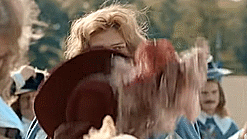
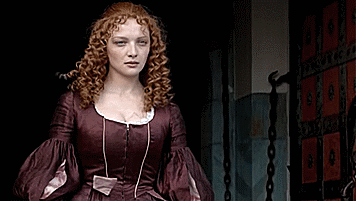
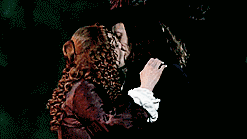
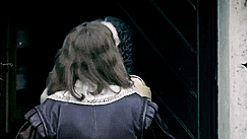


Athos x Milady de Winter / Aramis x Madame de Chevreuse - The Three Musketeers (Russian, 2013 - Три мушкетера)
#the three musketeers#thethreemusketeersedit#perioddramaedit#athos#milady de winter#aramis#madame de chevreuse#athos x milady#aramis x madame de chevreuse#milathos#Три мушкетера#alexandre dumas#the three musketeers 2013#yuriy chursin#ekaterina vilkova#pavel barshak#ekaterina olkina
34 notes
·
View notes
Link
A new chapter is up, in which Richelieu is trolled and Treville has the Musketeers-certified Man Pain.
#team trevilieu#trevilieu#the musketeers#s2 rewrite#writing#fic#i need to sort out my writing fanfiction tags coz they are nonexistent but still manage to be a whole ass mess#my thirst over madame de chevreuse is apparent and evident but i honestly don't give a shit because#was this fic writte JUST so i could thirst over madame de chevreuse?#..............................................you will never know. never.
2 notes
·
View notes
Note
Favourite female character of all three musketeers books?
Madame de Chevreuse!
That's her around 1621, a few years before the events of the first book. She's cute :)
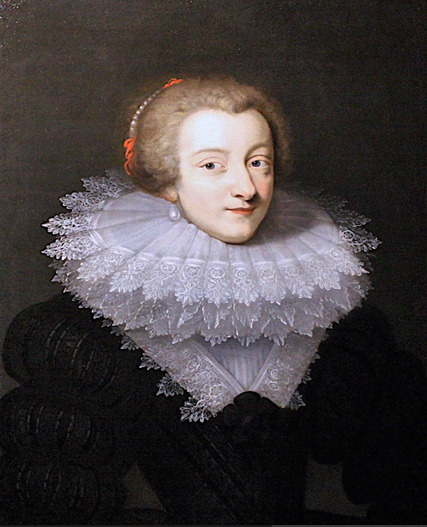
27 notes
·
View notes
Photo
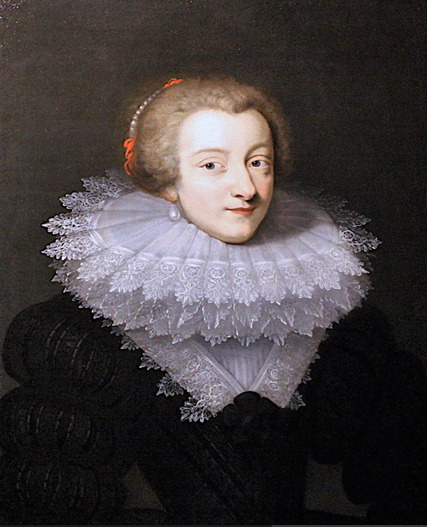
Marie de Rohan (December 1600 – 12 August 1679) was a French courtier and political activist, famed for being the center of many of the intrigues of the first half of the 17th century in France. In various sources, she is often known simply as Madame de Chevreuse.
6 notes
·
View notes
Text
“Well, then, let us say no more about it,” said d’Artagnan; “and let us burn this letter, which, no doubt, announces to you some fresh infidelity of your GRISETTE or your chambermaid.”
“What letter?” cried Aramis, eagerly.
“A letter which was sent to your abode in your absence, and which was given to me for you.”
“But from whom is that letter?”
“Oh, from some heartbroken waiting woman, some desponding GRISETTE; from Madame de Chevreuse’s chambermaid, perhaps, who was obliged to return to Tours with her mistress, and who, in order to appear smart and attractive, stole some perfumed paper, and sealed her letter with a duchess’s coronet.”
“What do you say?”
“Hold! I must have lost it,” said the young man maliciously, pretending to search for it. “But fortunately the world is a sepulcher; the men, and consequently the women, are but shadows, and love is a sentiment to which you cry, ‘Fie! Fie!’”
“d’Artagnan, d’Artagnan,” cried Aramis, “you are killing me!”
“Well, here it is at last!” said d’Artagnan, as he drew the letter from his pocket.
Aramis made a bound, seized the letter, read it, or rather devoured it, his countenance radiant.
“This same waiting maid seems to have an agreeable style,” said the messenger, carelessly.
“Thanks, d’Artagnan, thanks!” cried Aramis, almost in a state of delirium. “She was forced to return to Tours; she is not faithless; she still loves me! Come, my friend, come, let me embrace you. Happiness almost stifles me!”
The two friends began to dance around the venerable St. Chrysostom, kicking about famously the sheets of the thesis, which had fallen on the floor.
At that moment Bazin entered with the spinach and the omelet.
“Be off, you wretch!” cried Aramis, throwing his skullcap in his face. “Return whence you came; take back those horrible vegetables, and that poor kickshaw! Order a larded hare, a fat capon, mutton leg dressed with garlic, and four bottles of old Burgundy.”
Bazin, who looked at his master, without comprehending the cause of this change, in a melancholy manner, allowed the omelet to slip into the spinach, and the spinach onto the floor.
“Now this is the moment to consecrate your existence to the King of kings,” said d’Artagnan, “if you persist in offering him a civility. NON INUTILE DESIDERIUM OBLATIONE.”
“Go to the devil with your Latin. Let us drink, my dear d’Artagnan, MORBLEU! Let us drink while the wine is fresh! Let us drink heartily, and while we do so, tell me a little of what is going on in the world yonder.”
6 notes
·
View notes
Text
I was swayed in those first few months to be antivaxx. However, as my due date creeped closer, I had discovered how inaccurate all that information was and opted to vaccinate my son and he's (now at 3) updated on all his age appropriate vaccines and I'm vehemently pro vaxx. I had high hopes that KVD would take the same route. "Yes, but I have my breviary to repeat," answered Aramis; "then some verses to compose, which Madame d'Aiguillon begged of me. Then I must go to the Rue St. Honore in order to purchase some rouge for Madame de Chevreuse. I still went on dates with my boyfriend, went to friends birthday parties, spent time with my family. I know people that went on international vacations and passed. It possible. Remove from heat and place lid on pot. Place on a towel on table. Make a towel tent over head and pot. Outside of things in the family being "awkward" because of the WF attacking the SDC we really don have much in proper terms of family dynamics for the Schnee family outside of that vagueness. The 김제출장샵 best and clearest example we have is Weiss 10th birthday when Jacques admitted he only married Willow for the Schnee name and that only clear on how 김제출장샵 it strained the parents. We still don have a specific idea of when either Weiss or Winter started to defy Jacques or how that affected them outside of them losing their status as heir, with Weiss having a guess of possibly being when she decided to enroll in Beacon, and the most we know of Whitley growing up is that he was close to Jacques and distant to his sisters.. "LOLA" is a 19 year old uni student. Her "boyfriend" is a 51 year old who runs a successful Perth consulting business. He paid her $75,000 last year.Lola is one of a growing number of babies young women and students who date older, rich men, known as daddies in return for lavish gifts and allowances.Lola says it a mutually beneficial setup. Though I personally of the opinion that the whole importance of the placement of pH dependent ingredients is a bit overblown on this sub anyway. I personally mix a couple of drops of the CC essence into my hydrating toner and that been working just fine for me. I think using it as instructed by the company would work just as well. The father of social science, Emile Durkheim, back in the 19th Century, predicted that ours would be an age of loneliness and addiction. Excessive gaming, internet and drug use increasingly mean we seek our kicks, our dopamine highs, not together but alone. The opioid scandal spotlights the issue of self medicating to achieve individual release. 3 days: Breakfast on pineapple upside down pancakes at Snooze (2262 Larimer St) before hitting a Colorado Rockies baseball game at Coors Field. The games are rarely sold out, so tickets are easy to come by but stay away from scalpers. The stadium sports the thinnest air in major league baseball, and a block of purple seats on the 20th row of the upper deck marks the point where it's exactly one mile above sea level. Engagement with the subreddit, and in game. We used the recruitment thread in the sub. We also helped out random people do quests that asked in the sub for help. Even so, by 3 months, probably because of how damaging the daily retinoid I was using on it, my skin looked a lot better but still somewhat dehydrated looking. I kept a simple routine during then because my face was so irritated, though sometimes I use the occasional MBD bird nest sheet mask that my skin loved and needed for that hydration. Now, my skin is still oily, I only started my slowly developing AB routine 7 months ago.
1 note
·
View note
Text
Victor Cousin
Victor Cousin
French philosopher and educator
French philosopher, educational reformer, and historian whose orderly eclecticism left him the very best known French poet in his own time.
In the École Normale in 1811 Cousin was affected by his research of their philosophers P. Laromiguière, E.B. de Condillac, and John Locke. He was soon impressed by the frequent Sense faculty in Scottish doctrine and from François Maine de Biran and Pierre-Paul Royer-Collard, whose assistant he afterwards became. After teaching briefly at the École Normale, Cousin went in Germany (1817--18), in which he met and was influenced by G.W.F. Hegel and Friedrich Schelling. Back in 1820, following antiliberal political feeling dropped in France, Cousin was deprived of his assistantship, and the École Normale was shut in 1822. Then he went to Germany, where for six months that he had been imprisoned (1824--25) on a political statement still not recognized. From the early 1820s he composed Fragments philosophiques (1826), finished variations of those works of the Greek Neoplatonic philosopher Proclus and of René Descartes, also started his own translation of the works of Plato.
Reinstated in the reopened École Normale (1826) in 1828, Cousin lectured on philosophy and gained unprecedented recognition. For another 20 years that he dominated the area in France. He became part of this council of people education (1830), of their Académie Française (1831), and also the Académie des Sciences Morales et Politiques (1832). In 1832 he had been appointed a peer of France and 2 decades afterwards was made a director of the École Normale. Following a trip to Germany to examine instructional procedures, he hailed the bill (introduced with the statesman François Guizot at 1833) that caused landmark reforms in French main education. After Guizot became prime minister at 1840, Cousin was appointed minister of public education.
Along with lectures and official responsibilities, Cousin wrote prolifically. Though he developed no philosophical program distinctively his own but, instead, constructed a system by the works of many others, he was able to change the accent in French doctrine from Materialism into Idealism. Positing God as founder and employing the idea to unite disparate facets of the planet, he turned into historic events to locate proof for God's work on earth and has been consequently attacked, especially by Roman Catholics, for denying divine revelation. He's also been criticized because of his simplistic and arbitrary division of philosophy into four orderly forms: sensualism, Idealism, Skepticism, and mysticism. He watched some truth in every one of them. Stressing the necessity to adopt the regions of sense, reason, and emotion within his work, he made from other people those components that best served his own intent.
trans. Cousin also wrote a set of research of 17th-century girls: Jacqueline Pascal (1845); La Jeunesse de Madame de Longueville (1853), together with copious nutritional supplements; Madame de Sablé (1854); and Madame de Chevreuse et Madame de Hautefort (1856).
Read more about Victor Cousin
0 notes
Text
Every Character in the d’Artagnan Romances with Mostly Useless Superpowers. (with spoilers!)
Made with @robininthelabyrinth and @eugeniedanglars.
In this universe, superpowers are distributed randomly, but super-powered people tend to join the aristocratic classes for snobbery purposes. Gascons tend not to have powers, instead choosing to run at the enemy screaming.
The Three Musketeers:
d’Artagnan: No powers. Who needs powers when you can just hit things very hard?
Porthos: Super-strength. Like. Is there any other option?
Aramis: Low-level telepathy so that people trust him and are charmed. Also, he’s a supervillain, but that’s nothing new.
Athos: Probability manipulation, but dependent on how noble and honorable and melodramatic he’s being. He does not actually know that; he’s just like this as a person. The probability manipulation also just makes events play out like the drama Athos believes he’s in rather than anything under his control.
Planchet: No superpowers.
Mousqueton: Bedazzling--he can make things glittery. This is why Porthos hired him.
Bazin: Makes an automatic negative impression on people. His personality doesn’t help.
Grimaud: An imprinting power, which imprinted on Athos. Whatever Athos wants or needs, Grimaud can get. Athos wants strawberries from across the globe? Grimaud can get them. Unfortunately, Athos never wants anything. Grimaud is okay with that.
Milady: Can instantly pinpoint someone’s weakness on sight. This is a fairly weak power, but Milady is just ruthless and intelligent enough to use it devastatingly.
Kitty: She can hover.
Rochefort: Like d’Artagnan, no powers. Sadly, sarcasm is not a power.
Constance Bonacieux: Being forgotten--one must make an effort to remember her. This is not useful to her in the slightest, particularly since her enemies make the effort.
Monsieur Bonacieux: ...Inexplicable narrative contrivance? ...no powers.
Monsieur de Treville: No powers.
Cardinal Richelieu: Can talk to cats, and uses them as spies. Also, he moves silently.
Louis XIII: He tested positive for superpowers at a young age, and everyone thought he’d get a powerful, martial superpower. His power is that he can make any flower smell like any other flower. That’s it. He is incredibly bitter about this.
Anne of Austria: She can make plants grow. As a noblewoman, she can’t use these powers in an offensive, or even useful, capacity, so she uses them to make gorgeous bouquets and have flowers grow as she walks. Louis XIII makes them smell like a corpse flower (the worst-smelling flower in existence.)
Duke of Buckingham: No powers.
Lord de Winter: Nope.
Tom Felton: If he so chooses, he can be totally unnoticeable. However, Puritans believe that superpowers are the devil’s work, so he never uses his. Milady gets him to use them in order to kill Buckingham.
Executioner of Bethune: Can throw fireballs. Lives in a wooden town.
Madame de Chevreuse: The more power she gets and the more intrigue she is embroiled in, the younger she stays.
Twenty Years After:
Mordaunt: Walking mood ring--he can tell what people are feeling. Unlike his mother, however, he does not use his powers to the fullest. Or even just well, honestly.
Mazarin: No powers, and hates it, but not as much as Louis XIII and Louis XIV--the Louis-Louis, if you will--hate theirs.
Charles I: Perfect hair, all the time. It doesn’t help him when his head cut off--when his head is held to the crowd, it is the first time his hair has been messy.
Duc de Beaufort: He can always get into a fight when he wants to.
Oliver Cromwell: As a Puritan, even if he has powers, he doesn’t use them.
Raoul de Bragelonne: Like his father, probability manipulation. Raoul’s is mood-based; when he is happy, he has good luck, and when he is sad, he has bad luck. Unfortunately, he is Athos’ son.
Vicomte de Bragelonne (all books):
General Monk: No powers.
Louis XIV: No superpowers, and very upset by this. He spreads the rumor that he can shine like the sun and merely chooses not to, but this is a lie. He is totally powerless.
Marie-Theresa: Minor telekinesis, but as a woman, can only use her powers for party tricks.
The Man in the Iron Mask (Philippe): No powers.
Madame (Henrietta): She sparkles. Not specific sparkles, just a general sparkly-ness.
Charles II: Similar to his sister, Charles II is glittery--“The King of Bling.”
Duke of Buckingham (younger): Like his father, no powers.
Monsieur (Philippe): His clothing is always perfect. He can run into the middle of a battle and still look glorious and gleaming while everyone else is sweaty and dirty. He has developed the fashion sense to flaunt this. Louis XIV absolutely hates this.
Chevalier de Lorraine: Once a week, he can hear a juicy piece of gossip.
de Guiche: He can make it rain, but he can’t make it stop.
de Wardes: He can see in the dark. He declines to tell anyone about this, even when duelling in the dark.
Manicamp: He is unobtrusive, and seems like he belongs anywhere he is. When he's around a group, he's with them, for better or for worse. If he talks to someone, he is generally accepted--"ah yes, Manicamp"--and people generally don't notice where his interests lie unless they think about it.
Louise de la Valliere: She can create spikes on things, which could have been useful if only she were anyone else. As it is, she uses her powers for decoration. Louis XIV is still upset about it.
Athenaïs de Tonnay-Charente: No powers. That's why Louis likes her so much.
Saint-Aignan: No powers. That’s why Louis likes him so much.
Montalais: Can see several minutes into the future.
Malicorne: Farsight--he can see things that are far away. He also taught himself how to read lips.
Colbert: No powers.
Fouquet: The more people like him, the more eloquent he is--he is wittier, funnier, a better poet, etc. His power literally depends on his friends.
Madame de Belliere: She is excellent at games involving throwing things--paper airplanes, frisbee, skipping rocks, tossing a ball in a cup. However, she’s terrible at games with hitting things, like badminton.
Vatel: Perfect at organizing, but that doesn't mean that what he organizes always works out, even though he thinks it does.
Trüchen: No powers.
(A short ficlet written in this universe is here.
If anyone wants to do anything in the universe or ask about a character we missed, please do, just tell me!)
#the d'artagnan romances#d'artagnan#athos#porthos#aramis#the three musketeers#twenty years after#the vicomte de bragelonne#the hippo roars
49 notes
·
View notes
Photo
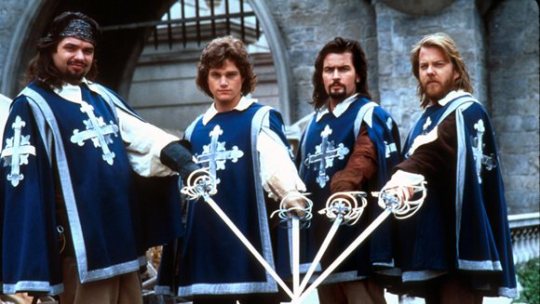
LITERATURA UNIVERSAL - LOS CLASICOS - LOS TRES MOSQUETEROS - ALEJANDRO DUMAS -
Los tres mosqueteros, es una novela del escritor Alejandro Dumas, publicada inicialmente en folletines por el periódico Le Siècle, entre marzo y julio de 1844. En ese mismo año fue publicada como volumen por la editorial Baudry y reeditada en 1846 por J. B. Fellens y L. P. Dufour con ilustraciones de Vivant Beaucé.
La novela relata las aventuras de un joven gascón de 18 años conocido como D'Artagnan, que viaja rumbo a París para convertirse en mosquetero. D'Artagnan no es uno de los mosqueteros del título, sino que lo son sus amigos Athos, Porthos y Aramis, amigos inseparables que viven bajo el lema «todos para uno y uno para todos». Juntos, sirven al rey Luis XIII y enfrentan a su primer ministro, el cardenal Richelieu, y a sus agentes Milady de Winter y el conde de Rochefort, para así resguardar el honor de la reina Ana de Austria.
La historia de D'Artagnan continúa en Veinte años después y en El vizconde de Bragelonne. Estas tres novelas de Dumas se conocen como Las novelas de D'Artagnan.
Gracias a su popularidad, la novela ha sido objeto de numerosas adaptaciones al cine y la televisión.
La historia comienza en 1625, en Francia. El protagonista, D'Artagnan, nacido en una familia noble empobrecida de Gascuña, se va de casa a París para cumplir su gran sueño: convertirse en un mosquetero de la «Compañía de Mosqueteros del Rey». A tal efecto, lleva consigo una carta escrita por su padre al capitán de la compañía de mosqueteros, el señor de Tréville, que también es gascón, y fue compañero suyo en las guerras de Enrique IV. Al pasar por la aldea de Meung, el joven gascón se ve envuelto en una pelea con un caballero misterioso (que más adelante se revelará como el conde de Rochefort), quedando herido e inconsciente. Cuando D'Artagnan recupera la conciencia, se da cuenta de que el caballero ha robado su carta de presentación, a raíz de lo cual nace en él un deseo de vengarse del misterioso personaje.
Ya en París, Francia, D'Artagnan, tras una breve y poco cálida entrevista con el Señor de Trèville, que sin embargo le previene contra el personaje que se encontró en Meung, es retado a duelo por los tres mosqueteros: Athos, Porthos y Aramis. Los cuatro hombres se encuentran y cuando D'Artagnan está a punto de comenzar a luchar contra Athos, son interrumpidos por los guardias del cardenal Richelieu que amenazan con arrestarlos, porque los duelos están prohibidos. Los tres mosqueteros y D'Artagnan se unen para derrotar a los guardias del cardenal, gracias a lo cual el gascón se gana el respeto y la amistad de Athos, Porthos y Aramis, volviéndose inseparables camaradas, así como el favor del Señor de Trèville. Luego de una entrevista con el rey Luis XIII, quien por su rivalidad con el cardenal queda encantado con D'Artagnan, este último es aceptado como cadete de un regimiento de la Guardia Real, presidida por el señor des Essarts, esperando la posibilidad de llegar a ser mosquetero.
Después de obtener alojamiento y tomar un criado, llamado Planchet, conoce a la joven y bonita esposa de su maduro casero, Constance Bonacieux, de la que inmediatamente se enamora. Constance y D'Artagnan ayudan a la reina de Francia, Ana de Austria y al duque de Buckingham a mantener una cita secreta en el palacio del Louvre. En la cita, la reina regala a su amante una caja de madera que contiene doce herretes de diamantes, originalmente regalados a ella por su esposo Luis XIII. El cardenal Richelieu, informado del regalo por sus espías, persuade al rey para invitar a la reina a un baile donde se espera que ella luzca los herretes, con la esperanza de descubrir al rey su historia de amor con Buckingham.
Constance intenta persuadir a su esposo, el señor Bonacieux, para ir a Londres y recuperar los herretes, pero éste, que había sido detenido, llevado a presencia del cardenal y convencido por éste de espiar a su esposa, se niega y la delata al Conde de Rochefort. D'Artagnan y sus amigos deciden asumir la misión en su lugar. Parten los cuatro amigos con sus lacayos, y después de una serie de aventuras y de quedar Porthos, Aramis y Athos fuera de combate y heridos por el camino, en emboscadas de los agentes del cardenal, D'Artagnan logra llegar a Inglaterra; tras herir y dejar fuera de combate a otro de los enviados del cardenal, el Conde de Wardes. Al notar Buckingham que le han robado dos de los doce, y teniendo la certeza que ha sido obra de la condesa de Winter, cierra los puertos ingleses para evitar que los herretes robados lleguen al cardenal, ordena a su joyero realizar dos réplicas de los faltantes, y los entrega a D'Artagnan junto con los originales, que parte para Francia y logra devolverlos a la reina Ana, justo a tiempo para salvar su honor, y para vergüenza del cardenal, que es puesto en evidencia delante del Rey.
La venganza del implacable Richelieu llega rápidamente: la noche siguiente, Constance es secuestrada. D'Artagnan parte para encontrar a sus amigos, y en Amiens, donde había quedado Athos, recibe como confidencia de éste la historia de un noble y su mujer, a la que, al descubrir que estaba marcada con una flor de lis en el hombro, había ahorcado, pero poco después, a causa de su borrachera, Athos reconoce sin quererlo que el noble de la historia en realidad es él. Poco después, se batirá con Lord de Winter, barón de Sheffield, y tras vencerle y perdonarle la vida, se hace amigo del barón. Mientras preparan la adquisición del equipo que necesitarán en la campaña del sitio de La Rochelle, D'Artagnan, reanuda relaciones con Lord de Winter, que le presenta a su cuñada, Milady de Winter. D'Artagnan rápidamente se enamora de la linda noble, pero pronto se entera de que ella no le ama, siendo en realidad una agente del cardenal. Con la ayuda de una criada llamada Ketty (a la que previamente ha seducido) se las arregla para pasar una noche con Milady, haciéndose pasar en la oscuridad por su amante, el Conde de Wardes. Pero poco después y tras haber tenido relaciones sexuales con ella (esta vez sin disfraces), D'Artagnan se entera de un terrible secreto: Milady tiene una flor de lis grabada a fuego en su hombro, marcándola como una delincuente. Milady reacciona intentando matar a D'Artagnan, que logra escapar de su casa, y acude a Athos, donde le cuenta que Milady tiene una flor de lis en el hombro, con lo que el mosquetero tiene la certeza de que se trata de la misma mujer a la que supuestamente había matado años antes. D'Artagnan se alivia cuando todos los guardias del rey son enviados a La Rochelle, donde el asedio de la ciudad protestante está teniendo lugar.
Milady hace varios intentos para matar a D'Artagnan dentro y alrededor de La Rochelle (primero mediante dos asesinos a sueldo, luego mediante un envío de vino de Anjou que hace pasar como proveniente de sus amigos), pero fracasa una y otra vez. Al mismo tiempo, y gracias a la ayuda de Aramis, que es amante de la duquesa de Chevreuse, confidente de la reina, D'Artagnan se entera de que la reina ha logrado salvar a Constance de la prisión, donde el cardenal y Milady la habían arrojado y que su amada está escondida en un convento.
Una noche, los mosqueteros escuchan por casualidad una conversación entre el cardenal y Milady, en la que Richelieu le pide asesinar al duque de Buckingham (un partidario de los rebeldes protestantes rocheleses). Ella pide a cambio la muerte de D'Artagnan. El cardenal entonces escribe un salvoconducto general a Milady ("Por orden mía y para bien del Estado, ha hecho el portador de la presente lo que ha hecho"), dándole así permiso para matar a D'Artagnan. Athos, revelado ahora como el conde de la Fére, rápidamente se enfrenta a su ex-esposa y la obliga bajo amenaza de muerte a abandonar el salvoconducto del cardenal.
Tras una hazaña bélica, el cardenal permite a D'Artagnan por fin ingresar en los Mosqueteros. Debido a la guerra entre Francia e Inglaterra, cualquier intento por parte de los mosqueteros para advertir al duque de Buckingham sobre Milady sería considerado delito de traición a la patria, pero son capaces de enviar a Planchet con una carta al cuñado de Milady (lord Winter), que por su parte siempre ha sospechado que Milady mató a su hermano.
Milady es encarcelada por lord Winter, al enterarse de su pasado y de sus planes sobre Buckingham, en su llegada a Inglaterra. Pero pronto seduce a su puritano carcelero John Felton y lo convence, no sólo de ayudarla a escapar, sino también de asesinar al duque de Buckingham, a quien aborrece desde antiguo. Mientras que el ingenuo Felton asesina con un cuchillo al primer ministro en Portsmouth, Milady logra embarcar rumbo a Francia. Tras avisar al cardenal de lo ocurrido, se esconde en el monasterio de Béthune, al norte de Francia. Para su sorpresa, encuentra allí a Constance, la cual había sido enviada por la Reina. Fingiéndose amiga de Constance, Milady averigua que su enemigo D'Artagnan llegará al monasterio en cualquier momento para rescatarla. Logra escapar justo antes de la llegada de los cuatro mosqueteros, pero no antes de tomar su venganza: envenenar a Constance, que muere minutos después en los brazos de su amado D'Artagnan.
En ese momento aparece Lord de Winter, y todos juntos determinan encontrar a Milady y juzgarla. La expedición queda a cargo de Athos, que revela a Lord de Winter que es el marido de Milady, componiéndose la expedición de los cuatro mosqueteros, sus cuatro lacayos, Lord de Winter y un misterioso hombre enmascarado, con una capa roja. Tras encontrar a Milady, organizan un simulacro de juicio contra ella en el que la acusan del envenenamiento de Madame Bonacieux; los intentos de asesinato de D'Artagnan; la instigación y complicidad en el asesinato del duque de Buckingham (del que son informados en ese momento por lord de Winter); la corrupción, traición y posterior muerte del siervo de Lord de Winter, Felton; el asesinato de su difunto marido, Lord de Winter (Conde, hermano mayor del Barón). El cargo final viene cuando Athos afirma que Milady, su esposa, es una criminal marcada con una flor de lis en su hombro. Cuando la condesa exige que Athos presente al verdugo que la marcó, el hombre con la capa roja se adelanta y se descubre. Ella inmediatamente lo reconoce como el verdugo de Lille, el cual narra las primeras fechorías de Milady que llevaron a su marca, tras seducir y corromper a un sacerdote, su hermano, que después se ahorcó por remordimientos cuando Milady lo abandonó por el Conde de la Fère (Athos). Tras ser condenada a muerte por los improvisados jueces, Porthos y Aramis, es ajusticiada (decapitada por espada) en la otra orilla del Lys, fuera del territorio de Francia (en la actual Bélgica).
Tras la ejecución de Milady, los cuatro mosqueteros regresan a La Rochelle. En su camino se encuentran con el conde de Rochefort, principal agente del cardenal y viejo némesis de D'Artagnan, quien viajaba a Armentiéres para encontrar a Milady. Rochefort también tiene una orden de arresto para D'Artagnan por alta traición y espionaje. Cuando el gascón se presenta ante Richelieu, le cuenta toda la verdad sobre Milady, y admite que él y sus amigos ya han juzgado, condenado y ejecutado a esa malvada mujer. A continuación le presenta a Richelieu el papel con el perdón total escrito por la propia mano del cardenal, que Athos le había entregado semanas antes tras quitárselo a Milady. Richelieu, impresionado por el ingenio de D'Artagnan y ya que ha conseguido lo que quería de Milady, ofrece al joven mosquetero un despacho como teniente de mosqueteros, con el nombre en blanco. El cardenal hace entrar a Rochefort y pide a los hombres estar en buenos términos y ser amigos.
El libro termina con D'Artagnan ofreciendo el despacho de teniente a cada uno de sus amigos, pero ninguno acepta y Athos escribe el nombre de D'Artagnan en él. Athos continuará siendo mosquetero, a las órdenes de D'Artagnan, hasta que entra en posesión de una herencia y se retira a sus propiedades; Porthos ha decidido casarse con Madame Coquenard, la viuda de un rico procurador, y deja el servicio y Aramis cumple su sueño de entrar en el sacerdocio, abandonando también el servicio, y entrando en un monasterio.
D'Artagnan se bate tres veces con Rochefort, hiriéndole las tres, pero tras eso, y tras decirle que seguramente le matará a la cuarta, hacen definitivamente las paces, y se abrazan de todo corazón y para siempre.
Sus vidas, sin embargo, se cruzarán una vez más, en Veinte años después.
8 notes
·
View notes
Text
El vizconde de Bragelonne | Alexandre Dumas
·OBRA | AUTOR | PERÍODO LITERARIO
El vizconde de Bragelonne es una novela históricade Alexandre Dumas, escritor y dramaturgo francés publicada en 1847. Es la tercera y última parte de la Trilogía de los mosqueteros.
·TEMAS PRINCIPALES
El amor, el reinado de Luis XIV, la amistad y la muerte.
·PERSONAJES
Raúl de Bragelonne: hijo natural del Conde de la Fère, Athos, y de la Duquesa de Chevreuse. Tras descubrir el engaño de su amada, Luisa, decide embarcarse a África para hacerse matar en una batalla. Al no lograrlo, termina suicidándose.
Luisa de La Vallière: amada de Raúl, se ‘’olvida’’ de él al interesarse por el rey, hasta convertirse en su favorita, afectando profundamente a Raúl. Finalmente termina relegada por el rey, al tener éste como nueva favorita a Madame de Montespan.
Luis XIV: monarca. Es un personaje ambiguo, siendo en ocasiones justo y noble, y en otras cruel e implacable.
Felipe: hermano gemelo de Luis XIV, quien ignora su existencia. Aramis libera a Felipe, ya que éste permanece cautivo en La Bastilla. Sustituye a su hermano gemelo y Felipe ayudaría a Aramis a convertirse en Papa.
D'Artagnan: el único de los cuatro amigos que se mantiene como mosquetero, siendo jefe de los guardias del rey. Al principio de la novela, decepcionado por la falta de autoridad de Luis XIV, renuncia a su cargo. Luego, con la ayuda de Planchet, dirige la operación para restaurar a Carlos II en el trono de Inglaterra, recibiendo por ello una gran recompensa que lo hace rico.
·ARGUMENTO DE LA OBRA
D'Artagnan es el capitán de los mosqueteros. Nuevamente, busca a sus amigos, esta vez para llevar a Carlos II a recuperar el trono que perdió su difunto padre. Athos no está de acuerdo con la relación que su hijo Raúl, el Vizconde de Bragelonne, tiene con la joven Luisa de La Vallière, pero ella secretamente se encuentra interesada en el rey Luis XIV. Aramis, nuevo jefe de los jesuitas descubre un secreto que ha mantenido oculto la monarquía francesa por años, Luis XIV no fue hijo único, tuvo un hermano gemelo que fue separado y criado lejos de la realeza, por temor que al crecer intentara luchar por su derecho a gobernar, él es Felipe quien desconoce sus derechos y ha crecido sin saber de su familia. Aramis planea suplantar al rey por Felipe, ya que el primero se ha vuelto tirano, pero tendrá que enfrentarse a sus amigos D'Artagnan y Athos, fieles al monarca.
·EL HOMBRE DELA MÁSCARA DE HIERRO
Voltaire; el «hombre de la máscara de hierro» era un joven alto y hermoso, de buena obediencia y a quien no se le negaba nada de lo que pedía en la Bastilla y en otras prisiones. Se le daba la mejor cena y el alguacil se reunía raras veces con el personaje. Además, le agradaban los vestidos finos y los encajes y le gustaba tocar la guitarra. Habría sido alimentado por un sordomudo. Tenía prohibido el contacto con el personal de la prisión y debía tener puesta la máscara todo el tiempo.
Los «hombres de la máscara de hierro»
Un hermano gemelo de Luis XIV.
Un hermano mayor extramatrimonial de Luis XIV.
Molière, el dramaturgo francés.
Nicolás Fouquet, ministro de finanzas de Luis XIV.
Mathiolli, un estafador.
Dubreuil, un espía de confianza que por un fiasco terminó condenado.
Eustache D'Auger, arrestado por razones desconocidas.
·OBRA DE ARTE
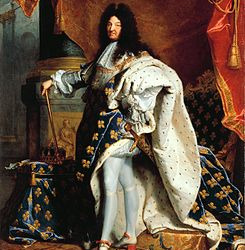
·MÚSICA
(Vídeo 2, al final de la página)
·PELÍCULA
Leonardo Dicaprio-Luis XIV/Felipe
Gerard Depardieu-Porthos
Jeremy Irons-Aramis
John Malkovich-Athos
Gabriel Byrne-D’Artagnan
-1998, escrita y dirigida por Randall Wallace.-
(Vídeo 1 al final de la página)
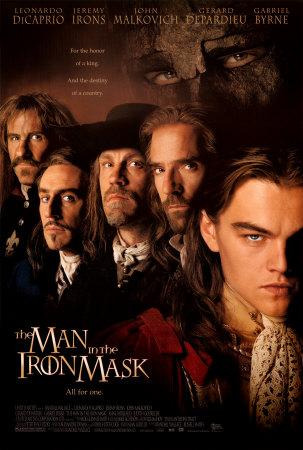
·OPINIÓN PERSONAL | RECOMENDACIÓN
Quiero comenzar diciendo que no me he leído ningún libro de ésta Trilogía. Me he leído adaptaciones, pero sí está en mi lista de lecturas. Me parece que es el mejor de los tres libros, ya que me gusta mucho la verdadera historia del hombre de la máscara de hierro. ¿Qué decir de Los tres mosqueteros? Nos han dado gran parte de cultura, histórica, literaria y cinematográfica.
Le recomiendo que si no es muy fan de las lecturas, comience viendo la película, ya que muestra muy bien la historia y refleja muy bien a Luis XIV de Francia y... ¡se quedará con las ganas de saber más!
Vídeo 1
youtube
Vídeo 2
youtube
3 notes
·
View notes